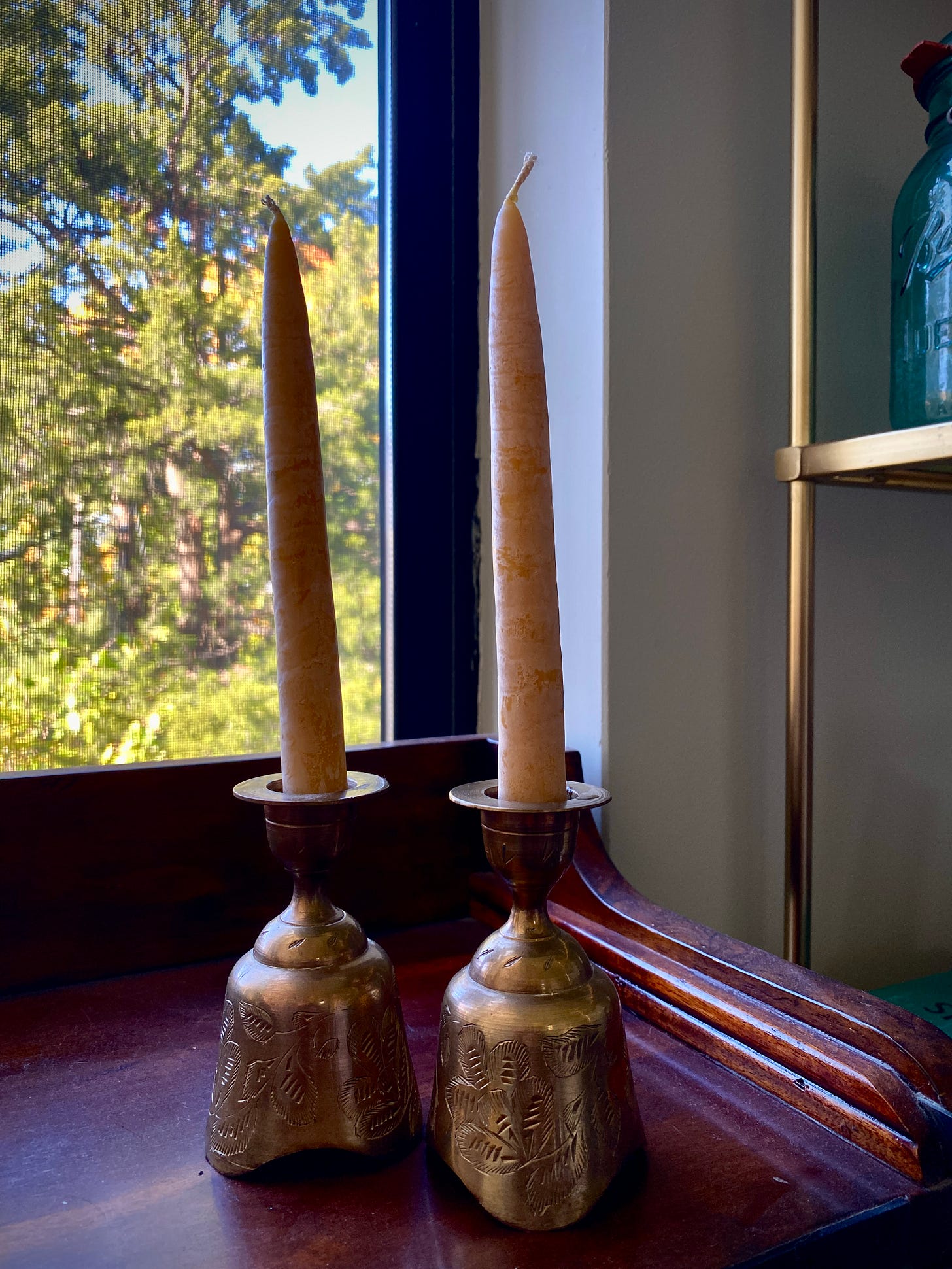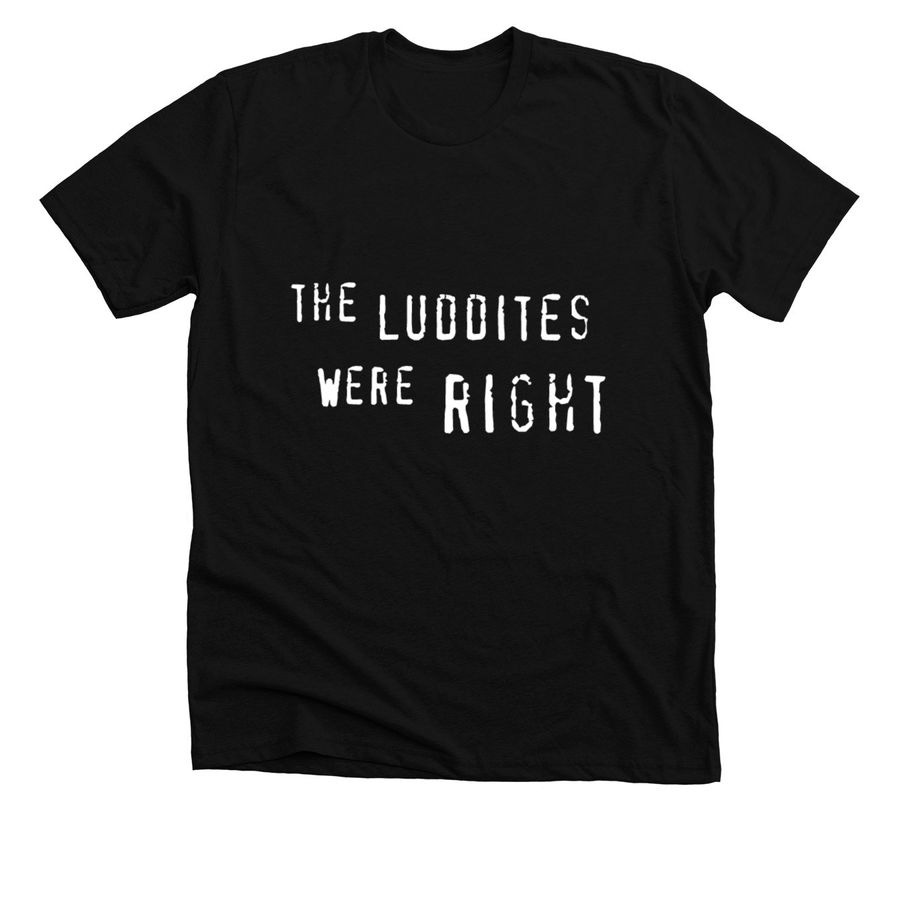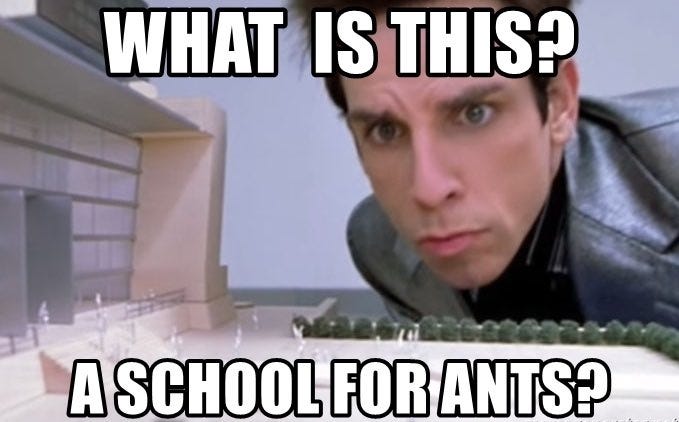Here’s some Brain Food for you! The things I’m reading and thinking about this week, including some books on Palestine, nationalism, and disaster capitalism that feel particularly critical to engage with at this moment. Also beautiful beeswax candles, and a great fantasy series for the darkening days.
Also, the Brain Trust advice column for paid Think Piece subscribers comes out this week! There’s still time to upgrade and receive the article. This week’s question is a good one: is online business dead? You gotta read it to find out!
🧠 Brain Food
I was interviewed by the delightful Khe Hy of Rad Reads on his podcast, The Examined Life (link is to to his YouTube, also available wherever you listen to podcasts). In this episode we discuss how to walk away from good money. I share more deeply about my post-HBA experience, and Khe shares very openly about his pivot away from teaching productivity. It’s a really great and honest episode. Check it out.
My colleague and friend Angela Parker is about to launch a beautiful coaching community for founders, creatives, and leaders. She’s doing a free training tomorrow at 12:15pm ET. It’s a proper workshop that you’ll get a ton out of if you’re struggling to scale your work without burning out. Angela was my coach as I was deciding to close HBA. She’s no-bullshit, the real deal, and her community is an amazing value.
Ghost has announced an interoperable newsletter recommendation feature. As I wrote in “The Case for Substack,” I really like Ghost and would be using it if I had slightly different goals. I hope to use it again. This is an exciting feature that I hope challenges other platforms *cough Substack* to consider more open integration *cough API wen*.1
A lot of folks are finding themselves in need of deeper resources about Palestine and the history of the Israel-Palestine conflict. Here’s what I’m reading right now. I’m going to leave comments open for all subscribers; please share your reading recommendations.2
This Twitter/X thread has a great list of Palestinian literature and non-fiction. I’m particularly looking forward to reading Edward Said’s The Question of Palestine.3 I first encountered Said in high school and his work radically changed my understanding of the world.
Woodbine, a local-to-me mutual aid collective and community space, is hosting a reading group on Sunday for Imagined Communities: Reflections on the Origin and Spread of Nationalism by Benedict Anderson. I just started it myself, not far enough to comment on it but the topic is on point. If you’re in New York City, come through.
I’m also reading Palestine: A Socialist Introduction, a collection edited Sumaya Awad and brian bean. The ebook is currently free through the publisher.
I often return to Naomi Klein’s Shock Doctrine in times like these. It gives much-needed context to the international machinations behind violent conflicts. Shock Doctrine was written in largely in response to 9/11 and the ensuing wars, which feel important to revisit as we see similar nationalism, dehumanization (on all sides, the rising antisemitism and islamophobia in the US and Europe is abhorrent and deeply troubling: people are NOT their governments), and international incentives emerging. Klein also wrote a powerful short op-ed in The Guardian last month about the importance of condemning the massacre of civilians regardless of which “side” they’re on.
As I mentioned on my podcast last week, I just re-read Wintering by Katherine May (
also has a lovely newsletter ). I am feeling a deep need to hunker down, and the book is good medicine for negotiating the realities of the world and the demands of your body. I know many of you, like me, are challenged by chronic health issues. This book is a balm.Inspired by May, I’m obsessed with lighting candles right now—day or night—and am really enjoying these beautiful tapers made in upstate New York by Alysia Mazzella. My evening routine right now includes lighting a few tapers in my living room and reading. My apartment has one main area,4 and the kitchen “section” has it’s own light, so I’m able to turn that on in the background for a boost and largely read by candlelight without straining my eyes. The experience cracks open a rich feeling of safety and helps to down-regulate my nervous system. Truly a sensual delight.
My current nighttime read5 is The Winternight Series by Katherine Arden. I’m on my third re-read of this beautiful series set in a fantastical medieval Russia. The books are dark and charming, and take place largely in winter, echoing my desire for the slow darkness these days. The author brings in a lot of Russian folklore and spirits, and explores the clash of Orthodox Christianity with older pagan traditions through the journey of a young woman with the sight. Rather brutal and realistic6, my favorite kind of fantasy.
This anonymous essay by a start-up founder in New York Magazine shows the emotional and strategic experience of trying to grow a company that can be sold or go public. I am dying to know who this is, of course, but do not. The essay gets to the heart of a particular kind of Silicon Valley rot which says that a decent salary isn’t enough: you have to be a king.
I’m on a no-buy myself,7 but surely someone here needs this “The Luddites Were Right” shirt designed by Wendy Liu (author of Abolish Silicon Valley: How To Liberate Technology From Capitalism which I’m about halfway through, thinking it might make a nice selection for a future Think Piece book club 👀). Brian Merchant, whose new book Blood in the Machine: The Origins of the Rebellion Against Big Tech about the Luddites is on my to-read list, shared about the shirt and I want someone to get it please it’s so good.8
That’s it for today! Thanks for reading. I’ll see our paid subscribers with the Brain Trust advice column later this week.
Some of the these are affiliate links. If you purchase I may make a small commission at no additional cost to you.
the lack of an API for Substack is one of the stronger indicators of the company’s worldview. It creates a walled garden that prevents writers like me from integrating Substack data with anything else in my software stack. It’s a choice…my guess is they would say it’s low priority in the midst of all of their other features that they want to rollout. I would like it though, and an API would show that they’re serious about supporting writers rather than forcing them into awkward manual actions to maintain lists and track readers (I couldn’t find anything about Substack responding to requests for an API other than this, but if you have info drop it in the comments.)
Respectfully, please. This is a heated topic and I welcome different perspectives, but will not tolerate hate speech of any kind.
It looks like this may be out of print, but there is a Kindle edition and some used paperbacks floating around the resale sites.
putting this together I realize I sound a little wild with how many in-progress books I have going on but I am bounce between books (I tend to read fiction first and last thing in the day, and then non-fiction throughout the day) and have invested a lot of time in becoming someone who reads a lot. I’m going to write about that soon because it was not a given in my early 30s. My friend
recently wrote an essay about reading that you should check out, especially if you find yourself having a hard time prioritizing reading. You are not alone in that.just people dying all over the place
this may shock you but launching a paid newsletter is not the most lucrative thing I’ve ever done
If you’re in the Bay Area you should totally go to this Luddite Tribunal with Merchant, Liu, and
. I wish I could make it!





